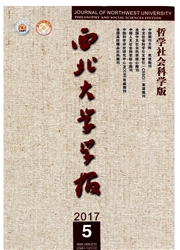

 中文摘要:
中文摘要:
从身体出发的中国哲学不仅导致了中国古人对身体的生命欲望的积极肯定,而且也进而从"欲"到"食"、从"食"到"味"地使"味道"作为"原道"地位得以确定。把这一理解用于审美领域,则使我们得出了这样一个极其重要的结论,即:对于中国古人来说,美与其说是一种贝尔所谓的视觉化的"有意味的形式"(significant form),不如说是一种我们所谓的味觉化的"有味道的形式"(tasty form)。同时,这种作为"有味道的形式"的美,一如对味道本身的分析所示,其具有"亲体性"、"咸和性"以及"品味性"这三个主要理论特征。这些特征表明,与中国古老的大易之道一致,并与业已趋于唯心化的西方传统的美学理论迥然异趣,中国古代美学代表了人类文化中的一种更忠实于我们自身生命的,也更为原生态的美的理论。
 英文摘要:
英文摘要:
Setting out from the body,Chinese philosophy not only results in positive affirmation to the life desire of the body from the ancient Chinese People,but also makes the status of "flavor" as "original Tao" be determined further from the "desire" to "food" and then from "food" to "flavor".If we put this understanding into the domain of aesthetic,we can draw such an important conclusion that beauty is more a flavored "tasty form" than a vision of Bell's so-called "significant form".At the same time,this beauty as "tasty form" just like the analysis to "flavor" itself has three main theoretical features of " Personal experience ","All in harmony" and "Tasting".These features suggest that the Ancient Chinese Aesthetic which is consistent with "Tao of Big Yi" in ancient China but differs from the western tradition which has idealism tendency in aesthetical theory represents a kind of human culture which is more faithful to our own lives,and also represents a theory of more original ecological beauty.
 同期刊论文项目
同期刊论文项目
 同项目期刊论文
同项目期刊论文
 期刊信息
期刊信息
